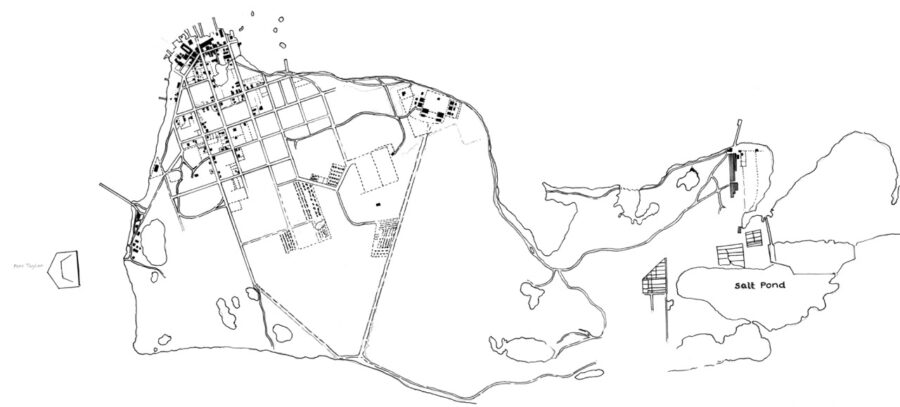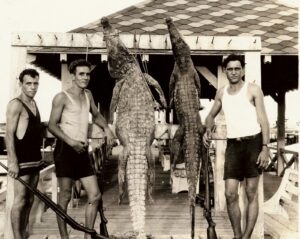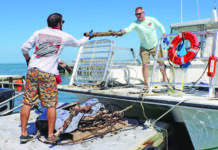In 1829, Monroe County lines stretched from Key West, the county seat, north to Lake Okeechobee and west to Port Charlotte (Charlotte Harbor between Fort Myers and Saint Petersburg).
North to south and east to west, the county was sparsely populated. With a population of about 500, Key West was the largest community in the county (the 1830 census counted 517 people).
The Florida Keys’ first newspaper, the Key West Register & Commercial Advertiser, arrived in 1829. Among other stories and advertisements, the paper printed ordinances issued by the Town Council and Edgar Macon, president of the Key West Town Council. Included in the new town laws were ordinances governing dogs, bathing, prostitution and guns.
“Dogs: Be it ordained by the Town Council of Key West that from and after the passage of this Ordinance each and every Dog in the Town of Key West (Terriers excepted) shall be subjected to a tax of two dollars a year to be paid by the owner of said dog.”
The town’s sheriff collected the tax. Each dog, with the exception of terriers, was required to wear a collar with the initials of the owner stamped on the collar. Any dog found running around Key West at large and without a collar, or any dog that had not had its tax paid, “shall be shot or otherwise killed by any citizen.” The marshal, too, could be contacted and directed to shoot the animal.

Bathing: an ordinance to prevent persons bathing in front of the Town.
“Sec.1 Be it ordained by the Town Council of Key West, That it shall not be lawful for any person or persons to bathe in public in front of the town of Key West, that is to say, two hundred yards south of the house of William Bunee Esq. to one hundred yards north-east of the canal leading to the pond in rear of the town.
“Sec. 2 Be it ordained, That any white person offending against the provisions of this ordinance shall, upon conviction, before the President of the Town Council, be fined a sum not exceeding five dollars.
“Sec. 3 Any person of colour offending against the provisions of this ordinance shall, upon conviction before the President of the Town Council, be punished with stripes not exceeding twelve.”
Prostitution: an ordinance to punish lewd persons.
“Be it ordained by the Town Council of Key West, that any female of evil fame (known to be such) supporting and maintaining herself by the unlawful profits of prostitution, or who shall live in a state of open adultery, within the limits of the corporation of the Town of Key West, shall upon conviction before the President of the Town Council, be fined for each offence, a sum not exceeding twenty-five dollars, at the discretion of the President.
“Sec. 2 It shall be lawful for the President of the Town Council upon the conviction of any person offending against the provisions of this ordinance, to exact and require of the person convicted, a bond with a penalty of five hundred dollars, with one or more sufficient securities, with a condition that the person so convicted, shall for the space of twelve months will and properly demean herself and not offend against this ordinance; and every person failing to give such bond shall be committed to the jail of the Corporation, there to remain until they give bond as herein required.” (Passed June 30, 1829)
The July 16, 1829, Volume 1 No. 27 edition subsequently published the following opinion piece.
“We refer the attention of our town readers to an Ordinance of the Town Council published in this week’s Register, ‘to punish lewd persons.’ We are proud to find independence enough in the Council to adopt such an ordinance: and we hope it may be rigidly executed, until those wretches, who have been such a disgrace to our society, may either become good citizens, or be entirely banished from the island.”
Guns: an ordinance more effectively to prevent firing and shooting within the corporation.
“Be it ordained, That when any person or persons shall allow, suffer, or permit any person whatever to shoot off, discharge, or fire any gun, or other fire arms, from any house or dwelling, whereof he, she, or they may be an occupant or occupants, and that give up or furnish the name of names of the person so firing or discharging, when required to do so by the town marshal, shall be guilty of an offense, and, on conviction before the President of the Council, be fined five dollars.”
The paper also shared the changing rules about having cattle in the town. “Two years ago fresh beef or mutton was almost unknown on the Island, and now a family would think it was faring hard indeed, if they sat down to dinner without roasting a piece of beef steak or mutton chops (March 5, 1829, Volume 1 No. 9).”
In a notice written by P.C. Greene dated Aug. 27, 1829, “All person or persons having Stock of any kind running at large on this island is hereby notified that they are requested to take up the same, and confine them in a lot, or remove them from off the island within the space of thirty days.”























